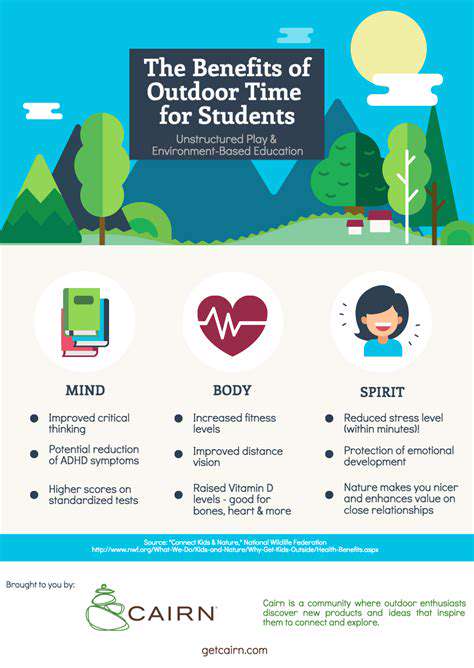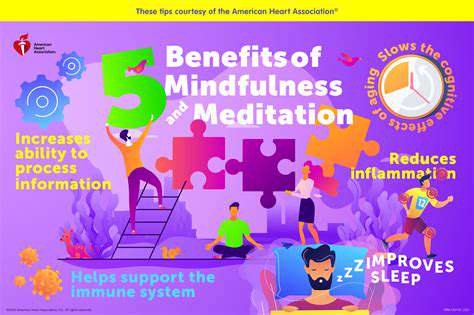Exploring the Profound Benefits of Nature Exposure for Mental Health and Well being
Enhancing Mental Health through Nature Immersion
Connection to Nature and Its Psychological Impact
Spending time in nature has been found to significantly enhance psychological well-being. Natural environments are inherently calming and provide a much-needed escape from the hustle and bustle of everyday life. This tranquility found in nature allows individuals to recharge mentally and emotionally.
Studies have indicated that exposure to natural surroundings can decrease levels of anxiety and depression. Nature acts as a natural remedy, promoting feelings of happiness and contentment. This connection is vital for emotional stability and improves overall mood.
Furthermore, engaging with nature can enhance cognitive functions. It has been shown to improve attention spans and problem-solving abilities, offering a refreshing break from technology-induced distractions. This mental clarity allows individuals to think more creatively and deeply.
The act of simply being in nature also promotes mindfulness. Engaging with one’s surroundings through mindfulness practices, such as meditation in a park or mindful walking on a trail, deepens one’s appreciation for nature and enhances emotional regulation.
Physical Health Benefits of Nature Exposure
Being immersed in nature not only uplifts the mind but also brings numerous physical health benefits. Activities such as hiking, biking, or simply walking in a park encourage physical fitness, which is essential for maintaining a healthy body and mind.
Physical activity in natural settings has been linked to reduced stress levels, improved cardiovascular health, and enhanced immune function. These benefits contribute to a stronger overall sense of well-being and can lead to longer, healthier lives.
In addition to exercise, the exposure to sunlight in natural environments can boost vitamin D levels, which is crucial for bone health and immune function. This vitamin also plays a role in regulating mood and warding off depression.
Ultimately, nature encourages a holistic approach to health, intertwining mental and physical well-being. Spending time outdoors can create a healthy cycle where physical activity leads to better mental health, which in turn motivates more physical activity.
Integrating Nature into Daily Life for Long-Term Benefits
To reap the lasting benefits of nature exposure, it is important to integrate nature into daily routines. Simple actions, such as taking a walk during lunch breaks or doing outdoor workouts, can create a positive habit that reconnects us with the natural world.
Creating green spaces at home, such as gardens or indoor plants, can also encourage daily interaction with nature. This personal touch not only beautifies living spaces but also fosters a calming atmosphere conducive to relaxation and reflection.
Additionally, encouraging community involvement in the preservation of local parks and natural areas can enhance social connections and a sense of belonging. This sense of community boosts mental health and promotes collective care for our environment.
Incorporating nature into daily life ultimately fuels a cycle of wellness. As individuals prioritize nature exposure, they cultivate healthier habits and build resilience against mental health issues, leading to a more fulfilling and balanced life.
Boosting Cognitive Function and Creativity
Enhancing Memory and Attention
Exposure to nature has been shown to have a remarkable effect on cognitive functions, particularly memory and attention. Studies indicate that spending time in green spaces can significantly improve focused attention, helping individuals to concentrate better on tasks.
The connection to natural environments allows for a reduction in mental fatigue. This refreshment can lead to improved performance in cognitive tasks, highlighting the importance of taking breaks in nature, whether it’s a walk in the park or a hike through the woods.
Moreover, engaging with nature can assist in recovering from cognitive overload. The calming effects of natural settings allow the brain to reset, making it easier to process information and retain memories, which is crucial for both students and professionals.
Stimulating Creative Thinking
Nature has a unique ability to inspire creativity. Studies have suggested that individuals often report enhanced creativity after spending time outdoors, particularly in environments rich with diverse flora and fauna. This immersion in nature can stimulate new ideas and perspectives.
By physically removing oneself from urban settings—often filled with distractions—individuals can tap into their creative potential more effectively. The tranquility of natural surroundings promotes a state of mind conducive to brainstorming and innovative thinking.
Furthermore, natural environments can facilitate divergent thinking, which is the ability to generate multiple solutions to a problem. This flexibility is key to creativity and problem-solving, demonstrating the powerful role nature plays in inspiring artistic and inventive expression.
Reducing Stress and Anxiety
Spending time in nature has been shown to significantly reduce levels of stress and anxiety. Natural settings are inherently calming, providing an escape from the fast-paced lifestyles often associated with modern living.
The physiological response to nature can include lower heart rates and reduced blood pressure, contributing to an overall sense of relaxation. Even short exposure to natural environments can elicit feelings of calmness and peace, offering a natural remedy for stress relief.
In addition, activities such as walking or meditating in nature foster mindfulness—a practice that has been proven to alleviate anxiety. As individuals become more present and aware of their surroundings in a natural setting, they tend to experience a greater sense of well-being, leading to long-term mental health benefits.
Physical Benefits of Spending Time Outdoors

Enhancing Physical Health through Nature
Spending time outdoors not only revitalizes the mind but also significantly boosts physical health. Research shows that being in natural environments can lead to reduced blood pressure, improved cardiovascular health, and enhanced immune function. These physical benefits are essential for long-term well-being and can contribute to a more active lifestyle.
Outdoor activities such as hiking, cycling, or simply walking in parks encourage physical movement, which helps combat sedentary habits that are prevalent in modern society. When people engage in outdoor activities regularly, they tend to experience higher energy levels and improved overall fitness. This means that incorporating nature into daily routines may lead to better health outcomes in the long run.
Moreover, natural light exposure is crucial for the body’s production of vitamin D, which supports bone health and immune function. Regular time spent outdoors can also aid in the regulation of sleep patterns, contributing to better rest and recovery. Ultimately, the relationship between nature and physical health is profound and cannot be overlooked.
The Psychological Advantages of Nature Engagement
Connecting with nature has remarkable psychological benefits that can enhance mental clarity and emotional resilience. Engaging with natural surroundings has been shown to reduce symptoms of anxiety and depression, creating a calmer mind. These improvements are often attributed to the soothing effects of natural landscapes and the distraction from everyday life stressors.
Furthermore, time spent outdoors helps ignite creativity and boosts cognitive function. Many people report enhanced problem-solving skills and greater innovation after spending time in nature. This renewed mental focus equips individuals with the tools needed to tackle challenges more effectively.
Nature can also foster social connections, as outdoor activities often involve communal experiences. Whether it’s participating in team sports, group hikes, or community gardens, these shared encounters can build relationships and strengthen support networks. This social aspect contributes greatly to an individual's overall mental health and well-being.
Fostering Social Connections
Building Relationships Through Shared Experiences
Spending time in nature often creates a perfect backdrop for developing and nurturing relationships. Engaging in outdoor activities, such as hiking, picnicking, or gardening, encourages individuals to bond over shared experiences. These moments foster communication and connection, breaking down barriers that may exist in more formal settings.
Moreover, when people participate in nature-related group activities, they often find a sense of belonging, which is crucial for mental well-being. This shared appreciation for the natural world can create lasting friendships based on mutual interests and experiences, ultimately enriching one’s social life.
The Impact of Nature on Community Engagement
Nature exposure not only benefits individuals but also fosters community engagement. Community gardens, local parks, and conservation projects create opportunities for individuals to work together towards a common goal. These collaborative efforts strengthen community ties, making individuals feel more connected to their surroundings and to each other.
Furthermore, participating in community activities centered around nature can lead to increased civic responsibility. People often become more engaged in local issues, advocating for green spaces and sustainability. This sense of purpose contributes to overall well-being and cultivates a positive environment for social interactions.











